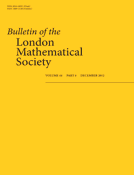
BULLETIN OF THE LONDON MATHEMATICAL SOCIETY
Scope & Guideline
Exploring Innovative Research in Mathematics
Introduction
Aims and Scopes
- Algebraic Geometry:
Research in algebraic geometry explores the properties and relationships of algebraic varieties, including birational geometry, Kähler manifolds, and moduli problems. - Functional Analysis:
This area includes studies on operator algebras, Banach spaces, and various functional spaces, emphasizing inequalities, embeddings, and the structure of operators. - Topology and Geometry:
The journal covers both algebraic and differential topology, with a focus on manifold theory, homotopy, and geometric group theory. - Number Theory:
Publications often delve into topics such as Galois representations, modular forms, and Diophantine equations, contributing to the understanding of arithmetic properties. - Partial Differential Equations (PDEs):
Research on PDEs includes qualitative analysis, existence and regularity of solutions, and connections to geometric analysis. - Combinatorics and Graph Theory:
This includes studies on graph properties, Ramsey theory, and combinatorial structures, often intersecting with algebra and topology. - Mathematical Physics:
This scope encompasses mathematical methods applied to physical problems, including quantum mechanics and statistical mechanics. - Representation Theory:
Research in this area focuses on the representation of algebraic structures, particularly finite groups and algebras, and their applications.
Trending and Emerging
- Higher-Dimensional Algebra:
Research exploring categories, derived categories, and higher algebraic structures is on the rise, indicating a growing interest in abstract algebraic concepts and their applications. - Geometric Analysis:
There is an increasing emphasis on the interplay between geometry and analysis, particularly through the study of geometric flows and their applications to manifold theory. - Noncommutative Geometry:
This area is gaining attention, with more papers discussing applications of noncommutative algebraic structures in various mathematical contexts. - Homotopy Theory:
Emerging themes in homotopy theory and its applications to algebraic topology are becoming more prevalent, suggesting a resurgence of interest in foundational aspects of topology. - Mathematical Aspects of Machine Learning:
The intersection of mathematics with machine learning and data science is increasingly explored, reflecting the relevance of mathematical frameworks in contemporary computational applications. - Arithmetic Geometry:
Research focusing on the arithmetic aspects of geometric objects, particularly in the context of moduli spaces and their applications, is witnessing growth. - Topology of Data:
The application of topological methods to data analysis is emerging as a significant trend, highlighting the relevance of algebraic topology in modern statistical methods.
Declining or Waning
- Classical Analysis:
Papers focusing on traditional topics of classical analysis, such as the theory of functions of a single variable, seem to be less frequent in recent volumes, indicating a shift towards more abstract or applied mathematical fields. - Elementary Number Theory:
There has been a decline in papers solely dedicated to elementary number theory, especially those that do not intersect with more modern approaches or applications. - Real Analysis:
Topics strictly related to real analysis, particularly those not engaging with functional analysis or PDEs, show a diminishing presence in the journal. - Commutative Algebra:
Research specifically centered on commutative algebra without connections to algebraic geometry or other advanced topics appears to be waning. - Traditional Geometric Structures:
Studies focused on classical geometric structures, like those based solely on Euclidean geometry, are becoming less common, as the journal leans towards more complex geometric concepts.
Similar Journals

Milan Journal of Mathematics
Connecting scholars to the pulse of mathematics.Milan Journal of Mathematics is a prestigious academic publication dedicated to advancing the field of mathematics, particularly in the miscellaneous areas of the discipline. Published by SPRINGER BASEL AG in Switzerland, this journal has established a strong impact in the academic community, noted for its Q1 ranking in Mathematics and achieving a commendable 80th percentile in the Scopus rankings. With an ISSN of 1424-9286 and E-ISSN 1424-9294, the journal serves as a crucial platform for researchers and scholars to disseminate their findings and engage with cutting-edge mathematical theories and applications. Although not an Open Access publication, it provides valuable insights and rigorous academic discourse for professionals, researchers, and students alike, fostering a rich environment for knowledge exchange and innovation in mathematics.

Mediterranean Journal of Mathematics
Bridging Theory and Practice in the World of MathematicsThe Mediterranean Journal of Mathematics, published by SPRINGER BASEL AG, is a prominent platform dedicated to the advancement of mathematical research and education. Since its inception in 2004, this journal has been pivotal in disseminating high-quality research across various fields of mathematics, currently holding a notable Q2 ranking in the miscellaneous mathematics category as of 2023. With its ISSN 1660-5446 and E-ISSN 1660-5454, the journal enjoys a respected position in the academic community, evident by its Scopus rank of 129 out of 399 in General Mathematics, placing it in the 67th percentile. While primarily a subscription-based journal, it remains committed to providing a comprehensive resource for researchers, professionals, and students, fostering dialogue and exploration within the mathematical sciences. The Mediterranean Journal of Mathematics, based in Basel, Switzerland, continues to contribute significantly to the evolution of mathematical theory and practice, marking its relevance as we approach its 20th anniversary in 2024.

Periodica Mathematica Hungarica
Elevating Research Standards in Mathematical Studies.Periodica Mathematica Hungarica is a prestigious academic journal published by Springer, focusing on the field of mathematics, with a particular emphasis on miscellaneous mathematical studies. Established in 1971, this journal has maintained its commitment to advancing mathematical research and its applications, making significant contributions over its converged years through 2024. With a Q2 ranking in the mathematics category as of 2023, it establishes itself as a vital resource within the mathematical community. Researchers and academics will find its inclusion in the Scopus database, ranking #189 out of 399 in general mathematics, indicative of its impact and relevance. Although it does not feature open access, the journal provides a wealth of high-quality peer-reviewed articles, thereby serving as an essential platform for the dissemination of innovative mathematical theories, methodologies, and findings. Engaging with the content of Periodica Mathematica Hungarica is crucial for anyone looking to stay at the forefront of mathematical research and development.
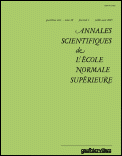
ANNALES SCIENTIFIQUES DE L ECOLE NORMALE SUPERIEURE
Connecting Ideas, Inspiring Discoveries in MathematicsANNALES SCIENTIFIQUES DE L ECOLE NORMALE SUPERIEURE is a distinguished journal published by the Société Mathématique de France, dedicated to advancing the field of mathematics through high-quality research articles. With a robust impact factor and categorized as Q1 in Mathematics (Miscellaneous) as of 2023, this journal ranks in the top 16% of mathematics publications, showcasing its importance and influence in the discipline. Available in both print (ISSN: 0012-9593) and electronic formats (E-ISSN: 1873-2151), ANNALES SCIENTIFIQUES serves as a central hub for innovative mathematical theories and methodologies, appealing to a diverse audience of researchers, professionals, and students alike. The journal publishes research that spans various domains within mathematics, fostering a collaborative environment for idea exchange. As it converges from 1997 to 2024, it continues to shape the mathematical landscape, providing essential insights and developments within the global academic community. Located in Paris, France, the journal invites contributions that push boundaries and advance the understanding of complex mathematical concepts.

TRANSACTIONS OF THE AMERICAN MATHEMATICAL SOCIETY
Fostering Innovation in Mathematical Theory and ApplicationsTRANSACTIONS OF THE AMERICAN MATHEMATICAL SOCIETY, published by the American Mathematical Society, is a premier journal in the field of mathematics that has been contributing to the advancement of mathematical knowledge since 1900. With an ISSN of 0002-9947 and an E-ISSN of 1088-6850, this journal holds a prestigious position in the academic landscape, evidenced by its Q1 rankings in both Applied Mathematics and Miscellaneous Mathematics categories as of 2023. With a Scopus ranking of #97 in General Mathematics and a percentile standing of 75th, the journal is recognized for its rigorous peer-review process and the quality of the research it publishes. Though it does not currently offer open access options, it essentially serves as a vital resource for researchers, professionals, and students seeking critical insights and developments in mathematical theory and applications. The Transactions aim to publish high-quality research articles that foster the exchange and dissemination of ideas, supporting the growth of both theoretical and applied mathematics within the global scholarly community.

ANNALES DE L INSTITUT FOURIER
Exploring the Depths of Number Theory and TopologyANNALES DE L INSTITUT FOURIER is a premier academic journal published by ANNALES INST FOURIER, specializing in the fields of Algebra and Number Theory as well as Geometry and Topology. Since its establishment, the journal has garnered a distinguished reputation, evidenced by its Q1 quartile ranking in the 2023 category assessments and its Scopus Rank of #37 out of 119 in Algebra and Number Theory, and #34 out of 106 in Geometry and Topology, placing it within the top percentile of its field. The journal serves as a vital platform for disseminating groundbreaking research and innovative methodologies, catering to a global audience of researchers, professionals, and students. With a commitment to the advancement of mathematical sciences, ANNALES DE L INSTITUT FOURIER invites contributions that push the boundaries of knowledge and foster collaboration across disciplines. Although it does not offer open access, the rigorous peer-review process ensures that published papers meet the highest academic standards, making it a critical resource for anyone engaged in advanced mathematical research.
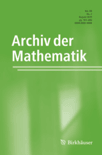
ARCHIV DER MATHEMATIK
Shaping the Future of Mathematics with Every PublicationARCHIV DER MATHEMATIK is a distinguished journal published by SPRINGER BASEL AG, renowned for its contributions to the field of mathematics. Established in 1948 and continuing its legacy through to 2024, the journal provides a platform for innovative research and scholarly articles that push the boundaries of mathematical theory and application. With an ISSN of 0003-889X and an E-ISSN of 1420-8938, it holds a reputable position within the academic community, reflected by its Q2 ranking in the 2023 Mathematics (Miscellaneous) category. Despite not being an open access publication, ARCHIV DER MATHEMATIK remains accessible to a global audience through various databases, ensuring the dissemination of high-quality research. The journal’s commitment to enhancing mathematical discourse makes it an essential resource for researchers, professionals, and students seeking to expand their understanding of this vital discipline.
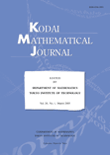
Kodai Mathematical Journal
Cultivating Knowledge in the Mathematical CommunityKodai Mathematical Journal is a distinguished publication dedicated to advancing the field of mathematics, particularly in miscellaneous areas. Established in 1949, this esteemed journal has been a reputable source for researchers and practitioners who seek to contribute to the rich landscape of mathematical knowledge. Published by KINOKUNIYA CO LTD, the journal is based in the academic environment of Tokyo Institute of Technology and serves a global audience with rigorous and insightful research articles. Despite its current Q3 quartile ranking in the Scopus Mathematics category, which reflects its niche but impactful contributions, the journal is poised for growth; the convergence of traditional and novel mathematical techniques promises to enhance its relevance further. Researchers, professionals, and students are encouraged to engage with the rich content of the journal, aimed at fostering collaboration and nurturing innovation in the mathematical community. While currently not available as Open Access, Kodai Mathematical Journal remains a critical resource for those passionate about mathematics and its applications.
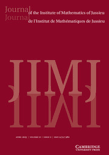
Journal of the Institute of Mathematics of Jussieu
Fostering Collaboration for Tomorrow's Mathematical BreakthroughsJournal of the Institute of Mathematics of Jussieu, published by Cambridge University Press, is a leading academic journal that has established itself as a vital resource in the field of mathematics. With an impressive impact factor and a ranking in the top quartile (Q1) of miscellaneous mathematics, the journal serves as a platform for high-quality research from both established scholars and emerging researchers. Spanning from 2002 to 2024, the journal aims to foster collaboration and innovation in the mathematical community by publishing original research articles, reviews, and critical discussions on a wide range of mathematical topics. Although the journal does not offer open access, it remains widely accessible through various academic institutions and libraries, ensuring that critical advancements in mathematics are shared with a global audience. Located in the United Kingdom at the prestigious Cambridge campus, the journal reflects the rigorous standards of its publisher and the rich academic tradition of its home institution.
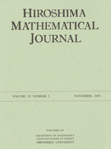
Hiroshima Mathematical Journal
A Legacy of Mathematical Research and DiscoveryThe Hiroshima Mathematical Journal, published by Hiroshima University, Graduate School of Science, serves as a prominent platform for disseminating high-quality research in the field of mathematics. Established in 1959, the journal has been an integral part of the mathematical community, focusing on areas such as Algebra, Number Theory, Analysis, and Geometry and Topology. Although currently classified in Q4 quartile rankings within its categories, the journal is committed to advancing mathematical knowledge and fostering scholarly dialogue. Its accessibility, combined with its long-standing history, makes it an essential resource for researchers, professionals, and students dedicated to exploring and enhancing the mathematical sciences. For those interested in contributing or accessing cutting-edge research, the Hiroshima Mathematical Journal continues to uphold its mission of excellence in mathematical scholarship.